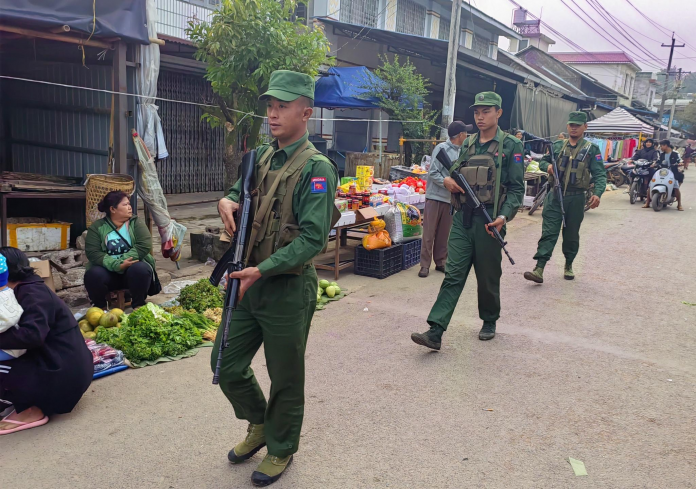Myanmar citizens with ethnic Bamar listed on their national identity cards report that the Myanmar National Democratic Alliance Army (MNDAA) has imposed entry and exit restrictions into the Kokang Self-Administered Zone of northern Shan State.
Ethnic Bamar are the majority in Myanmar. But in northern Shan State’s Kokang the majority are ethnic Kokang Chinese. Residents with mixed Bamar ancestry also report to be impacted by the MNDAA restrictions.
The MNDAA is a member of the Brotherhood Alliance, along with the Ta’ang National Liberation Army (TNLA) and the Arakan Army (AA). It launched Operation 1027 on Oct. 27 – seizing over 100 military outposts and at least nine towns, including key border trade posts with China – in northern Shan State.
“When I showed my identification card at the checkpoint, [MNDAA troops] couldn’t even read it. They asked me questions in Chinese, and I answered in Burmese,” a Myanmar man with ethnic Bamar listed on his ID told DVB on the condition of anonymity.
The MNDAA and the TNLA signed a ceasefire with the military in Kunming, China on Jan. 11. But the AA is continuing its offensive against the military in Arakan State, which it launched on Nov. 13. It has made significant gains by seizing 10 towns.
Resistance groups formed after the 2021 military coup have criticized the MNDAA for its targeting of ethnic Bamar in Kokang. Several of them, including the People’s Defense Force (PDF), People’s Liberation Army (PLA), and Bamar People’s Liberation Army (BPLA), have fought alongside the MNDAA in northern Shan during Operation 1027.
“This kind of racism is not good as the Bamar people have also fought in this revolution,” a PDF member told DVB on the condition of anonymity.
The MNDAA has denied all accusations that its troops are mistreating ethnic Bamar in Kokang. It claimed that discrimination on the basis of ethnicity is not allowed in its ranks.
In March, media reported that the MNDAA destroyed buildings in a neighborhood of the Kokang capital Laukkai home to ethnic Bamar residents. Others claimed that the MNDAA has seized homes rented to ethnic Bamar, or mixed, families.
The MNDAA was founded in 1989 after the collapse of the Burmese Communist Party. It is also a member of the Federal Political Negotiation and Consultative Committee (FPNCC), an alliance of ethnic armed groups in northern Myanmar.



